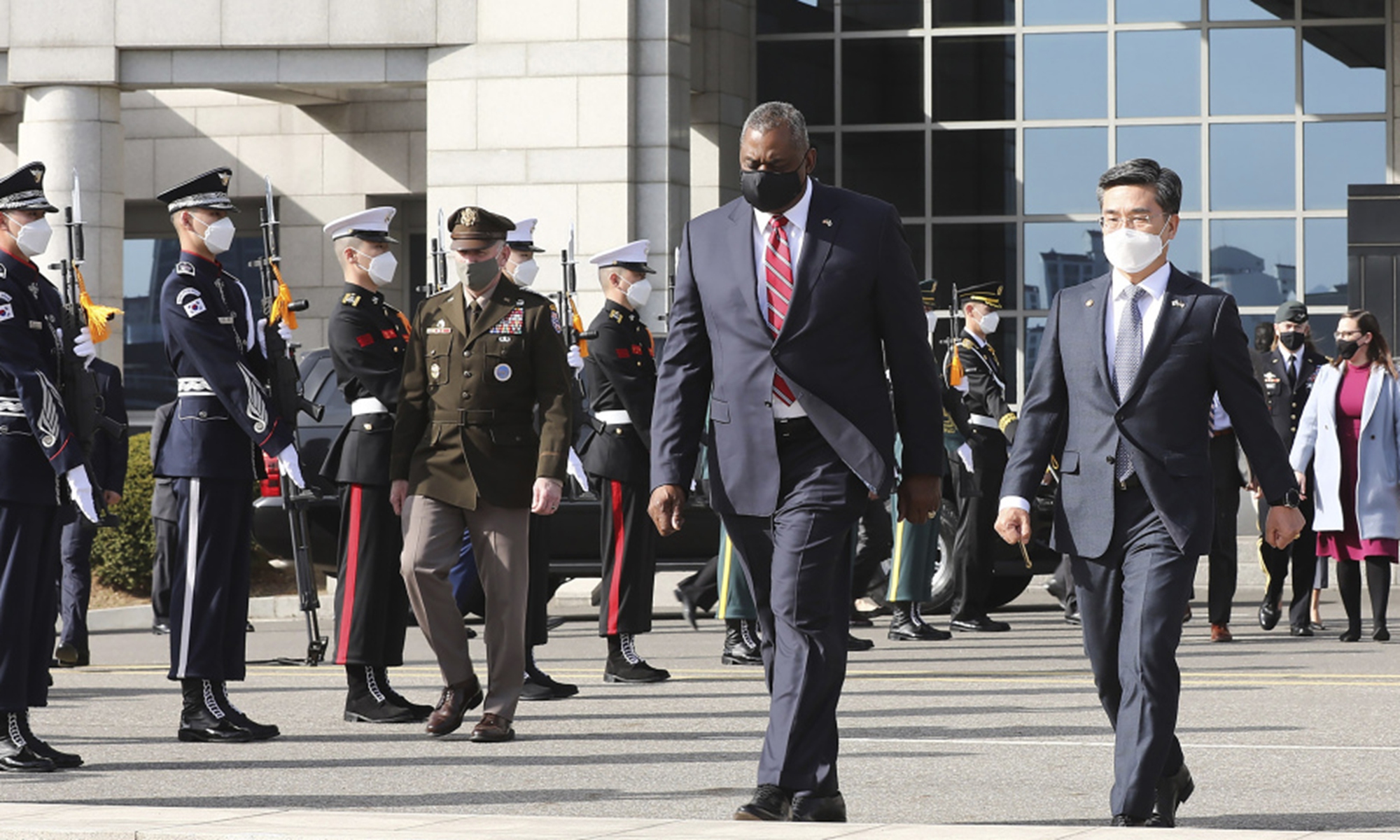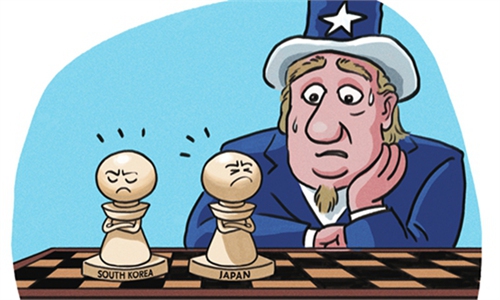
A US Defense Secretary Lloyd Austin inspects an honor guard with South Korean Defense Minister Suh Wook (right) during a welcome ceremony at the Defense Ministry in Seoul, on Wednesday. Photo: AP
"China threat" narrative peddled by two senior US envoys may be downplayed by South Korea, although US officials have successfully lured Japan, who is willing to downgrade itself as US "strategic appendage," Chinese observers predicted, noting that South Korea, which relies heavily on China both economically and politically, will pose as the "weak link" of the US strategy of encircling Beijing in this region.
Right after arriving on Wednesday afternoon, US Defense Secretary Lloyd Austin told his South Korean counterpart Suh Wook that the US alliance with South Korea is ever more important because of growing security concerns over China and North Korea, South Korea's Yonhap news agency reported.
Wook, without mentioning China, only replied that it is important for the allies to maintain a strong deterrence and joint defense posture against North Korea, the agency added.
Seoul's reluctance to openly defy China coincides with Chinese observers' views that South Korea, with strong political and economic reliance on China, will distance itself from the US-initiated Asian alliance to contain China.
Before South Korea, US Secretary of State Anthony Blinken and Austin visited Japan, a trip that bred what Chinese observers deemed the "most acrimonious" joint statement against China between Washington and Tokyo.
The joint statement said "The US and Japan acknowledged that China's behavior, where inconsistent with the existing international order, presents political, economic, military and technological challenges."
Blinken told a press conference following the meeting that their meeting covered not only the Diaoyu Islands, where China and Japan have disputes, but also Hong Kong and Xinjiang, on which Japan rarely openly criticizes China.
In response, Zhao Lijian, a spokesperson of China's foreign ministry, lashed out at Japan, saying Tokyo's alliance with Washington showed it was "willing to depend on the pleasure of the US for its selfish purposes, and downgraded Japan as the US' strategic appendage."
The US and Japan stick to the Cold War mentality, trying to form a circle to contain China, which goes against the trend, said Zhao, noting that their behavior will only bring chaos, and even conflicts in the region.
Lü Yaodong, director of the Chinese Academy of Social Sciences' Institute of Japanese Studies, told the Global Times the fact Japan has pointed a finger at China on topics including Hong Kong and Xinjiang, which it didn't touch previously, shows Japan aims to deliberately stir trouble between the two countries.
Jiro Honzawa, who is a veteran political reporter and once accompanied then Prime Minister Masayoshi Ohira to China in December 1979, told the Global Times that Japan, who relies on the US on politics and security arena, while relying on China for economic development, tries to squeeze benefits from both countries and is making a "sneaky move."
After taking office, Japanese Prime Minister Yoshihide Suga's performance has been unsatisfactory, as his support has been undermined by his son's unusual ties with businessmen. Uncertainty over whether the Tokyo 2020 Olympic Games will be held as scheduled also hit his approval rating, according to Japanese experts. Suga is betting on buttering up the US to keep some political achievements, and strives to please the Biden administration.
Lü said that Japan's move makes it hard for people to believe it sincerely wants to improve relations with China, and even shows it does not take its relations with China very seriously. If Japan continues to follow the US, ties between China and Japan will keep spiraling downward.
The weak link
Although concrete results from talks between South Korea and US officials are expected on Thursday, Chinese observers predicted an enhanced military alliance between the two countries, as well as Korean Peninsula issue, will top the agenda, not countering China.
South Korea may be the weak link among the US-initiated Asian alliance to encircle China, Zheng Jiyong, director of the Center for Korean Studies at Fudan University in Shanghai, told the Global Times.
From South Korea's perspective, the Biden administration's Asia strategy is still centered on "America first," and to cement Washington's interests in this region, but failed to take into consideration Seoul's interests, according to Zheng. He pointed out Seoul now faces many structural dilemma which it cannot solve without help from Beijing, for example, boosting its sluggish economy, and mediating to ease its ties with North Korea.
Before the top US officials' visit to South Korea, Kim Yo-jong, vice department director of the Central Committee of the Workers' Party of Korea (WPK) and the sister of North Korean leader Kim Jong-un, warned the Biden administration's joint military drills with South Korea that target North Korea "trying hard to give off powder smell in our (Korea Peninsula) land," Rodong Sinmun, the flagship newspaper of the WPK reported on Monday.
"If it (the Biden administration) wants to sleep in peace in the next four years, it had better refrain from causing a stink as its first step," she said.
Hours after Kim's statement was published, Seoul's defense ministry described the joint exercises as being defensive in nature and urged dialogue between the two sides.
It seems that the Biden administration is playing a hard line in dealing with North Korea, but its high-profile broadcast of joint military drills has put South Korea in a passive position, which will eventually propel Seoul to distance itself from Washington, and tilt more to China in dealing with the Korea Peninsula issue, said Da Zhigang, chief expert at the Northeast Asian Strategic Studies Institute.
The two senior American envoys' Asian tour shows that the US is aware that it cannot singlehandedly challenge China's rise in this region, and needs help from "old allies," said Da, noting that unlike "spineless" Japan, South Korea will be the one that fizzles out of the US plan to encircle China.





